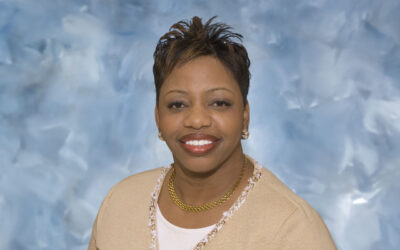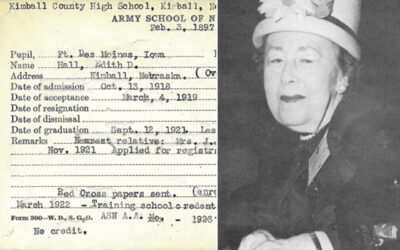By Matt Skoufalos
Some nurses almost seem to have been born into the profession. Kathy Mertens isn’t among them, but that hasn’t limited the impact of her work or the trajectory of her career.
“I really was interested in science and math, and as I got into school, I realized I wanted to be closer to people and not under a microscope,” she said. “I learned the nursing aspect of community health, but I also learned the health services.”
Mertens completed her bachelor’s of science in nursing at the University of Wisconsin in Madison, and then proceeded to the University of Washington School of Nursing, where she earned a master’s degree in community healthcare systems and public health. After she graduated, Mertens started working at the King County health department. An initial focus on school health and epidemiology helped her become “a systems thinker,” leading naturally to a concentration in health systems and organization when Mertens finished her nursing doctorate at Oregon Health Sciences.
“I was always drawn to that population health and wellness focus, and I was really interested in cross-cultural health,” Mertens said. “After I finished my schooling, I worked in a safety net hospital with a lot of medically vulnerable patients. Then, I did a public health research project in Alaska.”
Working out of Fairbanks, Mertens flew to the interior of the state, visiting villages along the Yukon River to perform pediatric well visits, hepatitis B vaccinations and an influenza trial. Traveling often meant braving weather conditions in small planes; compared with her experience in acute care, it was a multidisciplinary approach, “and it was really going where individuals were around their health,” she said.
“When you’re out in the community, you really rely on patients coming to you, or being as close to them as you can,” Mertens said. “We’re looking away from acute care, and focusing on the convenience, where patients are, where individuals are. It’s amazing to me, and so in line with how I’ve wanted to approach caring for patients.”
Although that shift in system thinking took some decades to engineer at scale, Mertens believes nurses are ahead of the trend because they’ve always considered the patient as a whole person. From pre-surgical visits, to procedures and recovery, she described the process of meeting and managing patient expectations as part of a continuum of care that extends ever broader into a cross-disciplinary focus.
 “Working across various organizations with people of all areas, whether in a clinic in a small village, or in their home – we even have nurses that are going into shelters or supportive housing – it’s just amazing how health care is really transforming at a broader scale,” Mertens said. “The grand realization is that health is more than clinical care.”
“Working across various organizations with people of all areas, whether in a clinic in a small village, or in their home – we even have nurses that are going into shelters or supportive housing – it’s just amazing how health care is really transforming at a broader scale,” Mertens said. “The grand realization is that health is more than clinical care.”
Only some 20 percent of health outcomes are dictated by health behaviors, Mertens said; the remainder is defined by socioeconomic factors like access to food, housing, employment and education. As such, health care workers need to build interdisciplinary partnerships outside their chosen fields to best affect health outcomes.
“When I worked in Alaska, the villages had community health aides that would work closely with the clinic,” Mertens said. “Patients would talk to the physicians by phone to try to determine what was needed. Now, we’re starting to talk about community health workers across our cities. We need someone out there who can help the patient access care, be the eyes in the home. That longer connection where the individuals are living makes such a difference.”
Forming those cross-sector partnerships can be quite successful, Mertens said. She described their benefit as continuing to improve patient health outcomes by working to build more supportive systems around a holistic approach. Driving the rest of the industry there requires “a lot of asking how we can do better,” Mertens said; staying curious and cultivating an open-minded approach to new opportunities.
At the forefront of that shift is the work that must be done to better support ambulatory care nurses, whose roles are changing rapidly, she said. As president of the American Academy of Ambulatory Care Nursing (AAACN), Mertens believes leadership is necessary to help define their new and expanding specializations in care coordination and transition management.
“I see a lot of work with our schools so we can train nurses to work in ambulatory care,” she said. “Very few nurses actually had clinicals in outpatient care, and that’s the key driver to get students to come into outpatient. It’s really trying new roles, training nurses in new scopes of practice, being a leader in collecting evidence, and looking at population. Community health workers are having to lead a lot of teams, having to oversee interventions.”
Mertens believes new nurses entering the field must keep a weather eye on these care coordination roles, and not worry as much about specific settings in their efforts to remain patient-centered. From working in new technologies, like telehealth, or coordinating among multidisciplinary teams both on and offsite, nurses will likely need to become more adept at embracing a holistic approach to care in order to drive the best health outcomes.
“There’s a lot more care being done between visits or in the areas beyond hospitalization,” Mertens said. “It’s all that connection and proactive work that’s happening more than it ever has. Nurses have to start doing more and more of that.”
She also believes that professional societies like AAACN, which help nurses learn their scope and standard of practice, continue to play a pivotal role in “keeping on the cutting-edge areas.” Whether through networking, policy and funding advocacy, education and research, and testing new care approaches, that work is more easily done in a collective fashion, and Mertens said it will only become more meaningful as those roles continue to evolve.
“That communication is really critical as we look to the future,” she said. “A lot of nurses have to be change agents and advocate for things, because health care is starting to demand it as we move to more value than volume.”










